Food has always been more than just nourishment—it’s culture, creativity, and community. And in recent years, there’s been a shift in how people experience it. Instead of heading to fancy restaurants, many now chase their favorite meals to parking lots, festivals, and street corners. The magic behind this? Mobile food trailers.
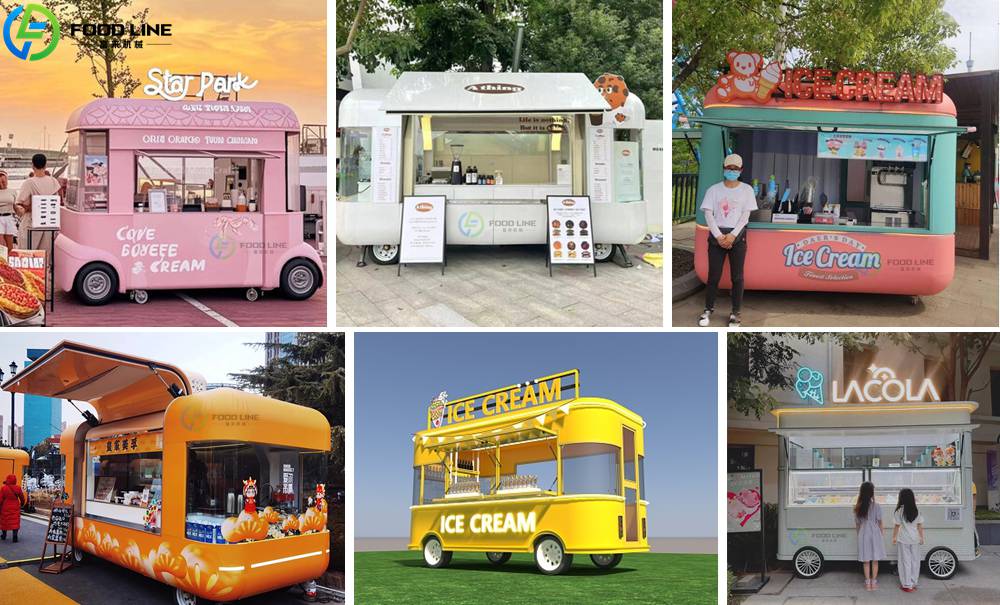
These mobile kitchen trailers are changing the way food entrepreneurs bring their ideas to life. Whether you’re selling artisanal coffee, street tacos, or gourmet grilled cheese, a mobile food trailer offers flexibility, affordability, and freedom that traditional restaurants often can’t.
If you’re considering jumping into the world of mobile dining, this blog is your one-stop guide. We’ll break down:
- The types of mobile food trailers available
- Step-by-step instructions on how to open one
- The requirements you’ll need to meet (licenses, permits, and equipment)
- Practical tips for success in the food trailer business
Buckle up—because by the end, you’ll have a complete roadmap to launching your own mobile food empire.
What is a Mobile Food Trailer?
The mobile food trailer is essentially a compact, fully equipped kitchen built inside a towable trailer. Unlike food trucks, they don’t drive themselves; instead, you hitch them to a vehicle and park them at your chosen spot.
Think of them as a restaurant on wheels:
- They have cooking appliances, storage, refrigeration, and sinks.
- They can operate in multiple locations, from busy downtown streets to seasonal events.
- They offer the same level of professionalism and safety as brick-and-mortar kitchens—just in a smaller footprint.
The beauty of mobile food trailers lies in their flexibility. Want to test out a new concept without spending six figures on a restaurant lease? A trailer can be your playground. Want to travel with your menu across cities and events? A mobile kitchen trailer makes it possible.
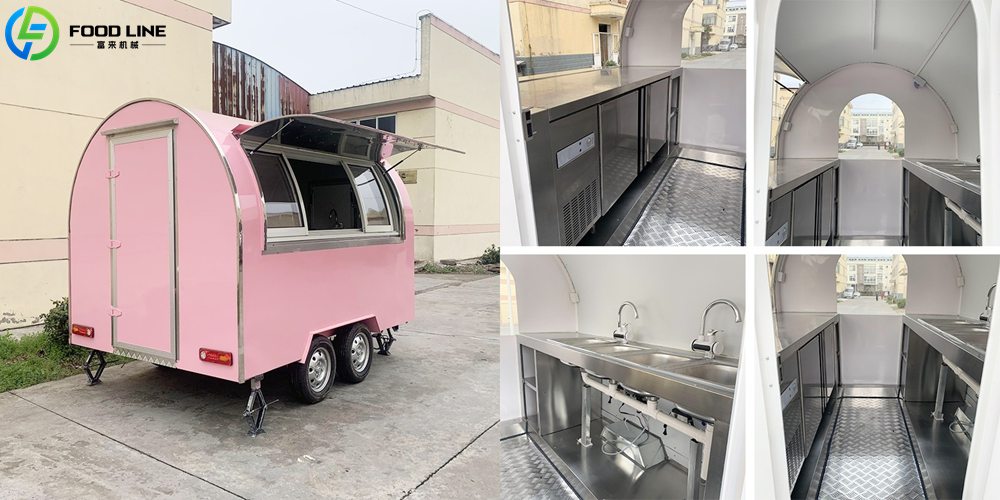
Types of Mobile Food Trailers
Not all trailers are created equal. The right one depends on your menu, audience, and business model. Let’s look at the main categories:
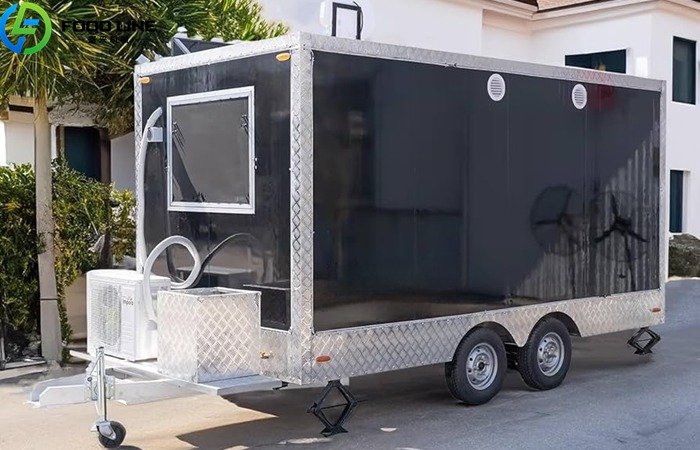
Standard Food Trailer
The most common option, equipped with grills, fryers, prep tables, and refrigeration. Perfect for general street food, burgers, fries, hotdogs, or mixed menus.
Best for: Beginners, fast food concepts, variety menus.
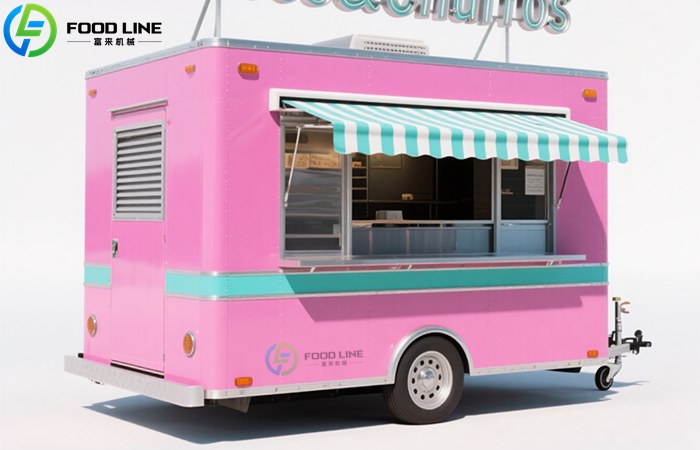
Specialty Cuisine Trailer
These are custom-built for a specific food style:
- Pizza Trailers – with wood-fired ovens.
- BBQ Trailers – featuring smokers and grills.
- Coffee Trailers – fitted with espresso machines and grinders.
- Taco Trailers – optimized for quick-serve assembly lines.
Best for: Entrepreneurs who want a unique, niche brand.
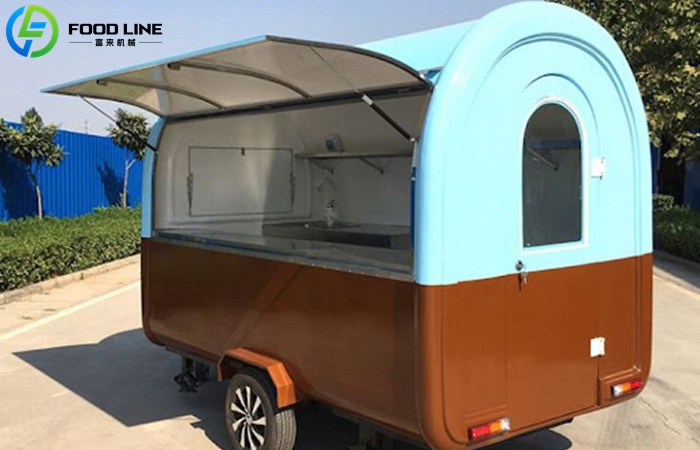
Dessert & Beverage Trailers
Compact, lighter, and less equipment-heavy. They focus on items like:
- Ice cream and frozen yogurt
- Smoothies and bubble tea
- Lemonade and fresh juice
- Specialty coffee or cocktails
Best for: Lower investment, festivals, hot-weather markets.
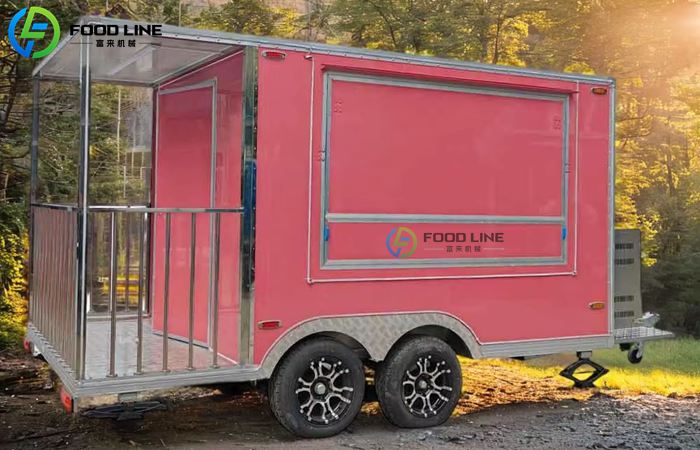
Expandable / Pop-Up Trailers
Some trailers come with side panels that open into serving counters or even seating areas. They’re visually striking and attract big crowds.
Best for: High-volume vendors at fairs, concerts, or large events.
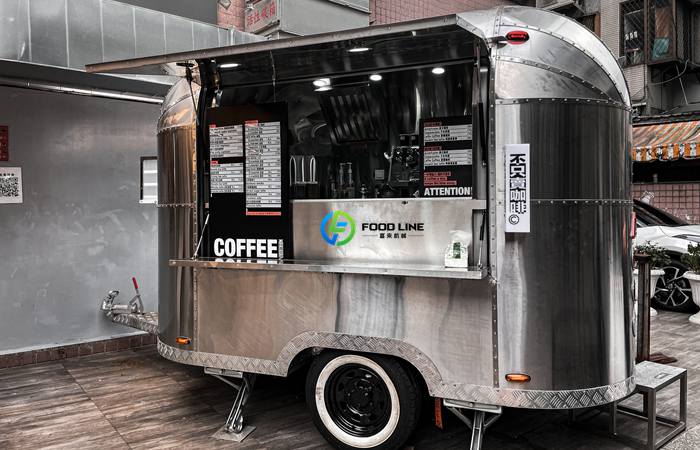
Luxury / High-End Food Trailers
Think gourmet food served in a stylish, branded trailer. These often feature designer interiors, stainless steel finishes, and LED displays.
Best for: Established restaurants extending into mobile catering, premium brands.
👉 Pro Tip: Always match your trailer type with your food concept. A pizza trailer with a real oven feels authentic. A coffee trailer with professional machines builds trust. Customers notice these details.
Why Choose a Mobile Food Trailer Over a Food Truck?
Food trucks for sale may get all the fame, but small food trailers have distinct advantages:
- Lower Cost – Trailers are cheaper to buy and customize than trucks.
- Flexibility – If your towing vehicle breaks, your kitchen still works. With trucks, the whole business stalls.
- Space Options – Trailers often offer more interior space than trucks of the same price.
- Scalability – You can expand with multiple trailers at different locations.
If you’re just starting out, mini food trailers usually make more sense economically and operationally.
How to Start a Mobile Food Trailer Business
Opening a food trailer business isn’t just about buying a trailer and cooking food. You need a plan, permits, and strategy. Let’s walk through the steps:
Step 1: Research & Plan Your Mobile Food Trailer Business
Choose a unique food concept by analyzing local demand and competition. Draft a simple business plan covering costs, pricing, and target customers. Check health codes, permits, and zoning laws for mobile vendors in your area. Proper planning now ensures smoother operations later. Focus on a niche with growth potential to stand out.
- Who are your customers? (Office workers, late-night crowds, festival-goers)
- What foods are trending locally?
- Who are your competitors? How can you stand out?
Step 2: Secure Financing
Calculate costs for trailer, equipment, permits, and inventory. Explore funding options like savings, small business loans, or investors. Consider leasing a trailer to reduce initial costs. Maintain a financial buffer for unexpected expenses. Keep detailed records for tax purposes and future scaling.
Step 3: Choose the Right Trailer
Buy a new or used trailer that fits your menu needs. Ensure it meets health department standards for plumbing, refrigeration, and ventilation. Customize branding with eye-catching graphics and a functional layout. Prioritize mobility and durability for frequent travel to different locations.
Step 4: Legal & Permits
Register your business and obtain an EIN. Apply for a mobile food vendor license and health department permit. Secure parking permits if required in your area. Get liability insurance to protect against accidents. Stay updated on local regulations to avoid fines or shutdowns.
Step 5: Set Up Operations
Source quality ingredients from reliable suppliers at competitive prices. Equip your trailer with efficient cooking tools and POS systems for smooth service. Hire and train staff if needed, focusing on speed and customer service. Optimize workflow to handle peak hours efficiently.
Step 6: Branding & Marketing
Develop a memorable brand name, logo, and social media presence. Offer promotions or collaborations to attract initial customers. Use high-quality photos and engaging posts to build hype. Attend local events and food truck gatherings to increase visibility. Encourage reviews and word-of-mouth referrals.
Step 7: Launch & Grow
Start with high-traffic locations like business districts or events. Track sales data to refine your menu and pricing. Expand through catering, partnerships, or additional trailers. Stay adaptable to trends and customer feedback. Reinvest profits strategically to scale sustainably.
Legal & Practical Requirements
Running a food trailer means meeting strict health and safety standards.
Health Requirements
- Handwashing sinks with hot water.
- Freshwater and wastewater tanks.
- Food-grade prep surfaces.
- Refrigeration for perishable goods.
Safety Requirements
- Fire extinguishers and first-aid kits.
- Ventilation systems.
- Safe propane/gas storage.
Operational Requirements
- Power source (generator or external hookup).
- Lighting for night operations.
- Waste disposal plan.
👉 Skipping these details could get you shut down by inspectors, so don’t cut corners.
Costs of Starting a Mobile Food Trailer
Your budget will depend on size, equipment, and customization. On average:
| Item | Cost Range (USD) |
|---|---|
| Trailer (basic) | $9,000 – $30,000 |
| Custom-built specialty | $30,000 – $80,000 |
| Equipment & appliances | $5,000 – $20,000 |
| Permits & licenses | $1,000 – $5,000 |
| Branding & wrap | $2,000 – $6,000 |
| Insurance | $500 – $2,000/year |
Total: Expect anywhere between $15,000 and $100,000+ depending on your concept.
Challenges of Running a Food Trailers
Like any business, there are hurdles:
- Weather Dependence – Rain or snow can kill business.
- Competition – Street food is booming, so stand out.
- Regulations – Permits differ city by city.
- Maintenance – Equipment, generators, and trailers need upkeep.
But with planning and creativity, these challenges are manageable.
Tips for Success in the Mobile Food Trailer Business
- Keep the Menu Simple – 4–6 items max, done perfectly.
- Location > Menu – The best food in a bad spot won’t sell.
- Engage Customers – Social media is your free marketing machine.
- Adapt to Seasons – Cold drinks in summer, warm meals in winter.
- Network – Work with event organizers, local breweries, and markets.
- Track Costs – Know your profit margins on every item.
The Future of Mobile Food Trailers
The industry is expected to keep growing. Customers love the convenience, affordability, and creativity of food trailers. With new technologies—like eco-friendly power systems, app-based ordering, and AI-driven customer analytics—the opportunities are endless.
Some operators even turn trailers into franchises, building multiple units under one brand. Others use them as test kitchens before opening full restaurants.
Either way, mobile food trailers aren’t a trend—they’re here to stay.
Frequently Asked Questions (FAQs) About Mobile Food Trailers
1. What’s the difference between a food truck and a food trailer?
A food truck is a self-driving vehicle with a kitchen inside, while a food trailer is towed by another vehicle. Food trailers are generally cheaper to start, easier to scale (you can have multiple trailers), and often offer more space at the same price point. Food trucks, on the other hand, provide more mobility but come with higher maintenance and startup costs.
2. Do I need a license to operate a mobile food trailers
Yes. You’ll need several licenses and permits to operate legally:
- A business license
- A food service permit from your local health department
- A mobile vending license (depending on your city)
- A fire/gas safety certificate if you use propane or fryers
Each region has its own requirements, so check with your local government before starting.
3. How much does it cost to start a mobile food trailer business?
Startup costs vary depending on trailer size and customization. On average:
- Basic trailer setup: $15,000 – $40,000
- Specialty/custom build: $50,000 – $100,000+
Add in permits, equipment, insurance, and initial food stock, and you’ll likely need at least $30,000 – $70,000 to launch comfortably.
4. Do I need a special towing vehicle for my food trailer?
Yes. Food trailers are heavy, often weighing between 3,000–10,000 lbs when fully loaded. You’ll need a vehicle with adequate towing capacity—usually a pickup truck, SUV, or van. Always check the trailer’s gross vehicle weight rating (GVWR) before purchasing.
5. What kind of food can I sell from a mobile food trailer?
Almost anything! Some popular options include:
- Fast food: Burgers, fries, hotdogs, fried chicken
- Specialty cuisine: Pizza, tacos, BBQ, sushi
- Desserts: Ice cream, waffles, pastries
- Beverages: Coffee, bubble tea, lemonade, smoothies
👉 The key is keeping your menu focused and efficient. Trailers have limited space, so 4–6 core items is ideal.
6. Can I run a food trailer year-round?
Yes, but it depends on your region. In warmer climates, you can operate year-round. In colder areas, winter weather may limit your business unless you adapt (e.g., offering warm drinks or soups, finding indoor vending spots, or catering private events).
7. Where can I legally park and sell food from my trailer?
It depends on local laws. Common spots include:
- Street-side parking (with a vending permit)
- Farmers’ markets and festivals
- Private events (with landowner’s permission)
- Business complexes and campuses (with agreements)
Always research city zoning laws and secure vendor permits for each location.
8. What utilities does a mobile food trailer need?
A professional trailer should have:
- Power supply (generator or shore power hookup)
- Freshwater tanks and wastewater disposal
- Ventilation and exhaust hoods
- Gas or propane systems (if cooking with stoves/fryers)
- Refrigeration for perishable items
9. How do I handle waste and sanitation in a food trailer?
Health departments require trailers to have:
- A freshwater tank (usually 30–50 gallons)
- A greywater tank (larger than the freshwater one, often 50–80 gallons)
- A handwashing sink and possibly a 3-compartment sink for washing utensils
- A plan for safe waste disposal at designated dumping stations
10. Do food trailers need insurance?
Absolutely. You’ll need:
- General liability insurance (covers customer accidents or food-related claims)
- Commercial vehicle/trailer insurance
- Product liability insurance
Some event organizers won’t even let you participate without proof of insurance.
11. Can I use a food trailer for catering?
Yes! Many successful trailer operators use them for weddings, corporate events, and private parties. Catering often pays higher than day-to-day vending because you can charge per guest or per event.
12. How long does it take to set up a food trailer business?
If you buy a pre-built trailer, you could be up and running in 1–3 months.
If you order a custom-built trailer, expect 3–6 months (depending on design complexity and local permit processing times).
13. What are the biggest challenges of running a food trailer?
- Weather dependence (bad weather kills foot traffic)
- Complicated city regulations (permits vary everywhere)
- Mechanical issues with towing vehicles or generators
- Competition in busy markets
- Staffing challenges (working in a confined space)
14. Can I franchise a mobile food trailer business?
Yes, some entrepreneurs grow by adding multiple trailers under one brand. A strong, recognizable brand and consistent quality are key if you want to scale.
15. What’s the future of mobile food trailers?
The trend is only growing. With rising restaurant costs, more entrepreneurs are choosing mobile food options. Future trailers may integrate:
- Eco-friendly solar or electric power systems
- Digital ordering kiosks
- App-based customer tracking
- AI-driven menu recommendations
Final Thoughts
Starting a mobile food trailer business is one of the most exciting ways to turn your love for food into a career. It’s flexible, affordable compared to traditional restaurants, and gives you the freedom to bring your passion straight to your customers.
From choosing the right trailer type and securing permits to building your brand and picking prime locations, success comes down to planning, creativity, and consistency.
So whether you’re dreaming of slinging BBQ at a summer fair, serving coffee at sunrise, or becoming the next taco sensation in town—the road to success is waiting. And it comes on four wheels, with a trailer hitch.